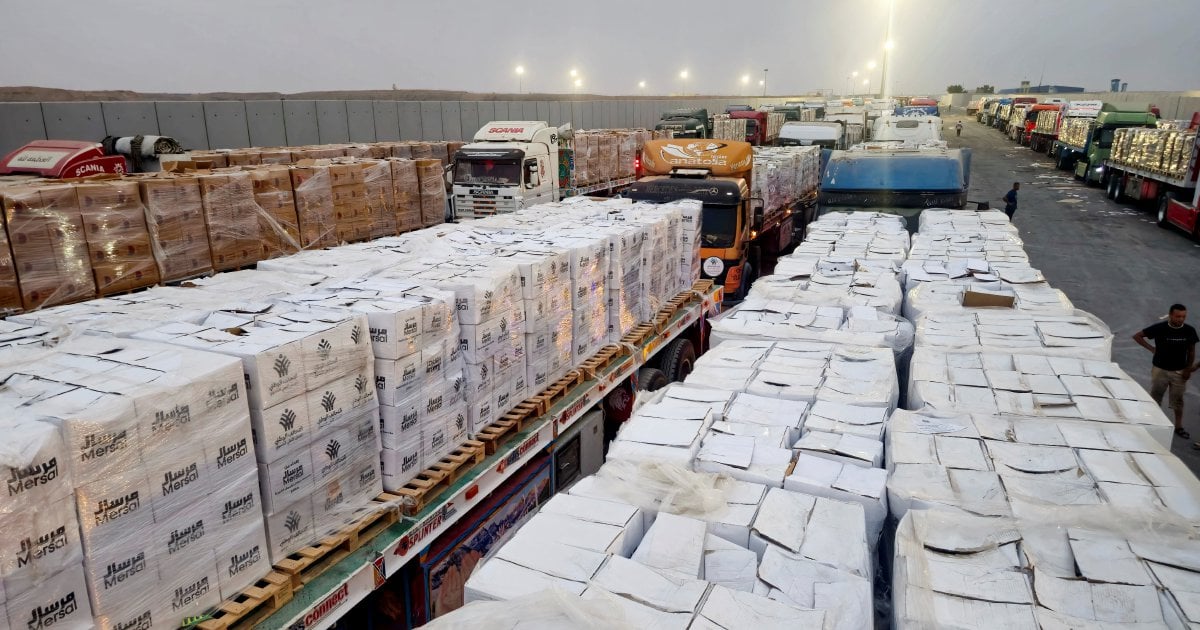Boxes of Gaza-bound aid turned back by Israel on Sunday languished atop a truck and flatbed trailer parked metres from its border with Egypt, as exasperated drivers and United Nations (UN) officials criticised delays in sending food and medicine to the enclave.
Seven aid officials and three truckers interviewed by Reuters listed a host of obstacles, ranging from rejections of shipments for minor packing and paperwork issues to heavy scrutiny over possible dual military use for a range of goods, as well as short working hours at the Israeli border crossing.
The supplies on the stalled truck and trailer outside Egypt’s Rafah border crossing carried blue logos of the World Health Organisation (WHO) and labels describing contents like topical medications and suction devices to clean wounds.
A WHO employee working at the border said the cargo was blocked for carrying “ille gal medicine s”.
Reuters visited Egypt’s border with Gaza on Monday on a trip organised by the Elders, a group of former world leaders set up by late South African president Nelson Mandela that backs a two-state solution to the Israeli-Palestinian conflict.
Some Elders members have been highly critical of Israel’s conduct in Gaza, including former Irish president Mary Robinson and former New Zealand prime minister Helen Clark, who joined the border trip.
Israel on July 27 announced measures to let more aid into Gaza. But aid agencies say only a fraction of what they send is getting in.
Clark expressed shock at the amount of aid turned back at the b order.
“To see this crossing, which should be a place where people interact with each other, where people can come and go, where people aren’t under blockade, where people who are ill can leave to come out — to see it just silent for the people, it’s absolutely shocking for us.”
Approvals and clearance procedures that got a shipment through the Rafah border crossing “within a few days” of arrival in Egypt during a ceasefire earlier in the war now took “minimum one month”, according to the WHO employee.
On Monday, the Gaza government media office said at least 1,334 trucks had entered Gaza through all land crossings, including from Egypt, since the Israeli measures announced on July 27, but this was far short of the 9,000 that would have gone in if 600 trucks had entered per day.
The United States has said a minimum of 600 trucks per day are needed to feed Gaza’s population.
In mid-July, Israel introduced a requirement that shipments of humanitarian aid arriving from Egypt undergo Customs clearance leading to “additional bureaucratic hurdles, delays, and costs for humanitarian organisations”.
More than 200 Gazans have died of malnutrition or starvation in the war, according to Palestinian health authorities, adding to the over 61,000 dead they say have been killed by military action. The UN and several expert studies have said the number is probably an undercount.
Drivers coming from Egypt go to the Israeli crossing of Kerem Shalom where shipments undergo checks.
Kamel Atteiya Mohamed, an Egyptian truck driver, estimated that of the 200 or 300 trucks trying to get through this route every day, only 30 to 50 make it.
“They tell you, for example, that the pallet doesn’t have a sticker, the pallet is tilted, or the pallet is open from the top. This is no reason for us to return it.”
He said while the Egyptian crossing was open day and night, drivers often arrived at Kerem Shalom only to find it closed, as it does not normally operate beyond weekday business hours.
“Every day it’s like this,” he said. “Honestly, we’re fed up.”
A logistics site set up by the Egyptian Red Crescent near El Arish town, 40km from the border, where shipments coming from Egypt to Gaza are loaded, has a tarp tent warehouse devoted to goods turned back from the border.
A Reuters reporter saw rows of white oxygen tanks, as well as wheelchairs, car tyres and cartons labelled as containing generators and first-aid kits and with logos of aid groups from countries such as Luxembourg and Kuwait, among others.
Reuters was not able to verify when the items at the Red Crescent site were turned back or on what grounds. Aid workers describe such rejections as routine.
The writer is from Reuters
© New Straits Times Press (M) Bhd






